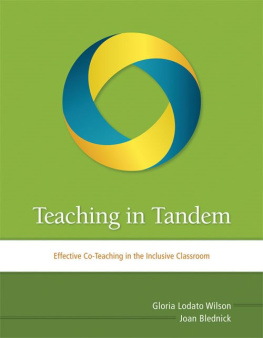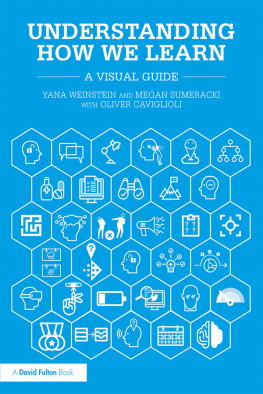Learning How to Learn
A Guide to Effective Teaching and Learning Strategies
First Edi tion
By
Mary E. Felton
Copyright 2016 by Mary E. Felton
ISBN: Softcover 978-1-5245-5093-6
eBook 978-1-5245-5092-9
All rights reserved. No part of this book may be reproduced or transmitted in any form or by any means, electronic or mechanical, including photocopying, recording, or by any information storage and retrieval system, without permission in writing from the copyright owner.
Any people depicted in stock imagery provided by Thinkstock are models, and such images are being used for illustrative purposes only.
Certain stock imagery Thinkstock.
Rev. date: 01/09/2017
Xlibris
1-888-795-4274
www.Xlibris.com
751438
Table of Contents
This book is a summarized guide for teachers and learners to enhance effective teaching and learning strate gies.
Learning and teaching go hand in hand; it is therefore imperative in the modern world that teaching is effective for the production of competent, effective and efficient learners. It is a process that demands of both parties a relationship of trust and confidence for optimal res ults.
I have tackled issues that span the whole teaching and learning range, from academic vocabulary to decision making. Academic vocabulary is important to master throughout the learning lifespan but is certainly more important in the foundation levels early lear ning.
This guide tackles strategies such as building background knowledge, technology as learning tools, metacognition, information retention and retrieval, and of course teac hing.
Read through for insights and benefits of these important techniques in the teaching and learning process. The reader will gain insights about and benefit from these important techniques in the teaching and learning pro cess.
Thank you for investing in this book and enjoy rea ding.
Dedicated to all who desire to l earn
Chapter
Developing Essential Academic Vocabulary
Due to the importance and the significance of vocabulary in academic background knowledge, the teaching and learning of academic vocabulary are essen tial.
Academic vocabulary is the foundational words necessary for a learner to understand academic concepts and are centered on specialized or technical words that are different from what is learned through speaking and reading. Learning academic vocabulary is not only for college level; they are words that form the language of learning that learners encounter throughout their academic life.
Academic vocabulary development involves five fundamental elements of learning how to read. The five aspects are:
- Vocabulary capa city
- Awareness of phon emic
- Knowledge of pho nics
- Flu ency
- Comprehension abi lity
Vocabulary development is important for learners to use words they hear and speak to make sense of them. Learners should be able to decode the meaning of words to effectively understand their meanings especially while rea ding.
Vocabulary is critical to reading comprehension throughout academic life; a reader will not be able to comprehend what he or she reads without knowing the meaning of the words. It is therefore important for students to learn the meanings of all new words, not part of their vocabulary, which they encounter to enable them to understand what they are rea ding.
For the most part, vocabulary is grasped indirectly through everyday encounters and experience with spoken and written language. However, there are technical or complex words that can only be learned by being taught directly through memorization or word r oots.
A solid mastery of vocabulary has been shown through research, to be integral to academic achievement; there is a relationship between vocabulary knowledge and the understanding of concepts in mathematics, the sciences and social stu dies.
As has been said, knowledge of academic vocabulary may not guarantee academic success, but a lack of it will ensure that one f ails.
Words, which form the basis academic vocabulary and understanding, are of inter-related. Knowing the meaning of words makes it easier to think through the concepts behind the word and develop understanding of the ideas. Vocabulary is integral to reading comprehension and is a relationship that carries on throughout reading development and remains so even for the most fluent rea ders.
The most effective way to teach academic vocabulary is through teaching specific phrases and words in specific ways. An effective teacher ensures that learners have the academic background knowledge needed to understand what is being ta ught.
When a school focuses on the same academic vocabulary and all teachers in the school teach it in the same way, a comprehensive academic vocabulary approach is developed which is a powerful tool for teaching. Continuous vocabulary reinforcement in all areas of instruction for students will have a significant effect on academic achieve ment.
Simply getting learners to look up vocabulary words in a dictionary, writing down and memorizing the definitions is not really an effective technique. The following are better strategies for teaching and learning academic vocabu lary:
- Use the context of the vocabulary to work out the meaning of the new word.
- Break words into parts, prefixes, suffixes and roots to get to the meanings of w ords.
- Use appropriate dictionaries to get the meaning of w ords
- Develop techniques of dealing with new w ords
- Implement a vocabulary building approach that works for the learner and improves the learners word aware ness.
Chapter
Building Background Knowledge
Background knowledge on any given subject is what makes what is being learned stick in the learners mind. Background knowledge is also referred to as prior knowledge- information on things or subjects accumulated by the person over time from experiences. It is a critical aspect of learning as it helps learners make sense of new information received through new experiences and i deas.
According to research and studies, the more information learners are already aware of about an issue or subject, the higher the likelihood of them being interested in learning new or more information on the particular subject. It is argued that everything we learn involves transfer of information from the prior experience however little or background knowl edge.
However, background knowledge is not the same for every learner since not each has the same experience of an issue as the other, if any at all and that is the big challenge in using it. In fact, differences in background knowledge can be responsible for disparities in understanding and comprehension and must be given the attention it deserves in teaching and lear ning.
For students to understand or comprehend a story, they need knowledge of the topic, without which it becomes difficult to conjure up an effective idea or mental image of what the topic is about. Background knowledge is critical in reading comprehension as well as in content learning; with prior knowledge of a topic, learners are better able to recall or elaborate more on a subject. Research on the brain and learning proves that students who have knowledge about a topic, however little, find it easier to learn new things about a topic. Conversely, those who are not acquainted at all with an issue find it very challenging to learn new th ings.
Exa mple:
In an astronomy class, you will find children who have been exposed to telescopes and those who have never seen one and then, there are those who have never really seen the constellations because the sky night is obscured by the bright lights of the towns they live. In the third group, there are children who go on and research and learn about the stars due to personal interest and passion in the sub ject.
Next page





